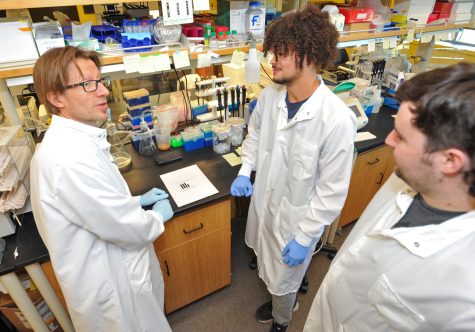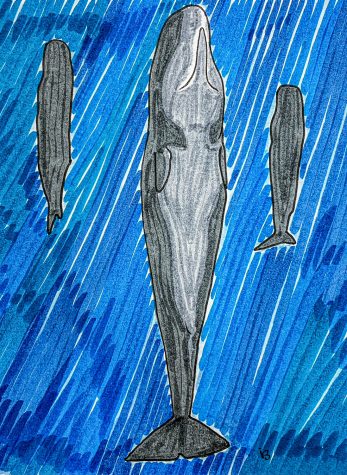Researchers investigate link between marijuana, male fertility
Potential health effects of cannabis unknown due to lack of studies
March 31, 2022
WSU researchers look for hints of the consequences that chronic cannabis use may have on male fertility. The findings were presented at the Showcase for Undergraduate Research and Creative Activities on March 28.
Marijuana is legal in Washington and is more popular than ever, especially among younger groups. With its growing influence, researchers want to know how it could affect future generations, said Greta Langholt, undergraduate research assistant at WSU.
“We’re basically looking at the transgenerational effects of chronic cannabis use on male reproductive function,” Langholt said.
The experiment involved exposing mice to a 200mg dose of cannabis vapor three times a day for 10 days. Another group of mice were (was – SK) only exposed to regular air, she said.
They found that the mice exposed to cannabis had decreased sperm counts and sperm motility, which affects their ability to swim, Langholt said.
At three months of age, both males that received cannabis and males that received air were bred with females never used in experimentation to get a second generation, she said.
The testes of the second-generation mice were examined at six days old and three months old. The 3-month-old mice from the group exposed to cannabis showed lower sperm counts compared to the control group, Langholt said.
The 6-day-old examinations looked for increased DNA methylation — which generally silences DNA — and DNA damage, she said.
“We saw DMNT1-positive germ cells in the testes in F1 [second generation] PND6 [Post-Natal Day 6], which is related to DNA methylation,” Langholt said.
The researchers checked the day six testes for DNA damage. They found an increased percent of positive tubules, which produce sperm, and positive cells per tubule in the second generation, which is related to DNA damage, she said.
A third generation [F2] was produced by breeding 2-month-old second-generation males from both the air group and the cannabis group with naive female mice, Langholt said.
She said both F2 groups were equal in terms of fertility, including sperm count, motility and spermatogenesis — the process where sperm is produced. This suggests that cannabis exposure in the first generation did not affect the sperm of the third generation.
There are relatively few studies dealing with cannabis, and many of the potential health effects from use are still unknown, Langholt said.
“Looking at what effect [cannabis use] could have on future generations … using a mice model, which is a lot more controlled than what a human model would be,” she said.

















